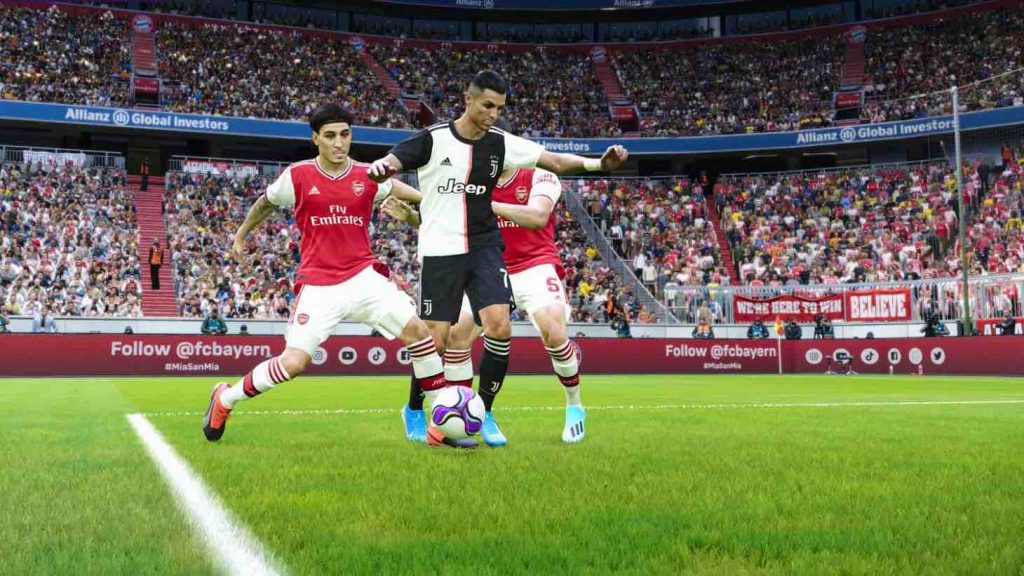
It’s been less than a month since eFootball Pro Evolution Soccer 2020 (PES 2020), the latest game in Konami’s long-running Pro Evolution Soccer series, was released. With its major competitor Electronic Arts’ FIFA 20 now entering the scene, football-hungry gamers face a serious decision in choosing between these two sport game juggernauts.
The Battle of the Licenses
While the reviews are out for PES 2020 and they are generally favourable, praising most aspects of the game ranging from AI to animation and ball physics to its realism-centered mechanics, a key concern of many football-savvy gamers is the series’ historic weakness when compared to FIFA 20 – its licensing issues.
Licensing issues have been the Achilles heel of the series in the past, but Konami have worked hard at securing the rights to more franchises, teams, players, etc. in recent years. With stiffening competition and more money being thrown around, licensing is once again coming to the forefront of the comparison between these two games but EA’s advantage is beginning to slip.

Licensing is essentially the purchasing of rights to include certain content in the game but these days navigating these deals is a lot trickier than it used to be. Licenses can be either exclusive or non-exclusive, and the rights to the physical appearance of players and their names are a separate issue to the names, badges, stadia, etc. of clubs and leagues.
This year things have become rather complicated in terms of licenses with Konami approaching the issue with new strategies. PES 2020 has a number of “partner clubs” – clubs that generally are in one way or another exclusive to PES 2020, alongside certain exclusive leagues. These partner clubs include Barcelona and Bayern Munich, whose stadia are only in PES 2020 and not FIFA 20, and Juventus, which as a lone Italian Serie A team has signed an exclusivity deal with PES 2020.
The case of Juventus represents a real role reversal between EA and Konami. EA will not have the rights to include the likeness of Juventus in their game and for this reason have had to invent the team Piemonte Calcio for FIFA 20. While EA have populated this team with the real players of Juventus – their kit and badge are different. This may sound like a small defeat for EA, but taken in its historical context this is a huge deal.
Konami are used to not having the rights to the biggest leagues in their games, and indeed in PES 2020 all Premier League teams except Arsenal and Manchester United have pretend names similar to Piemonte Calcio. Similarly, most La Liga teams have fake names (although guides exist to help players rename them). However, EA has usually enjoyed dominance in terms of licensing and the omission of Juventus in FIFA 20 has indicated to gamers, shareholders and sports executives alike that this dominance may be a thing of the past.
FIFA 20 v PES 2020
Those of you who aren’t crazy about football might roundabout now be asking yourselves why exactly this is such a big deal. After all, it’s just the name, kit and badge of teams that are changing, right? And sometimes also the stadium in which they play? This doesn’t affect the mechanics of the simulation in the game? While it’s true that these issues are, in a sense, only cosmetic, they have massive implications for gamers as well as the gaming industry at large.

If you’re a fan of Ronaldo it’s a richly emotional experience to see him scoring a hat trick to the sounds of roaring Juventus fans in Allianz Stadium and correct in-game commentary. But seeing him scoring for Piemonte Calcio in a custom arena with commentators prevented from saying Juventus just isn’t the same. And the same is of course true to the satisfaction derived from beating your arch-rivals!
Furthermore, even outside the game, football video games are one of the ways that help us fans keep up to date in terms of teams and players. They help us refresh our memory and maintain a high level of football knowledge. This is important not only for impressing your friends by knowing the key attributes of players such as their position, speed and which foot they prefer. It is also important for those of us who put this knowledge to good use in our betting strategies in real life. So many of us use games like FIFA, PES and Football Manager to increase our football knowledge so that we can then go online to use sites such as https://bettingonline.co.uk to turn our knowledge into cash (hopefully). It’s a lot harder to keep track of everything when names of leagues, stadia, teams and their kits are different to the real thing.
The Future
In terms of the industry at large, EA for the first time missing out on a major licensing battle will encourage both Konami as well as other possible future developers to take up the fight for licenses – now that the big leagues and clubs know that there are more publishers than just EA interested in purchasing rights to their content, they’ll surely be happy to receive other offers.

It also means for EA specifically that they likely won’t have the ace of all licenses up their sleeve for much longer. Given that the PES series has often compared favourably with FIFA instalments in the past in almost all respects except licensing could spell out increasing difficulty for EA to compete in the future. Perhaps they are aware of this likelihood and have included the innovative VOLTA street football mode in FIFA 20 in an attempt to begin a process of differentiating the series from PES in other ways.
The future of footballing games is exciting. Although the creators of FIFA, EA Sports, have been quite heavily criticised recently, the intensifying competition between EA and Konami looks like it has already raised the quality of their games and will likely continue to do so in the future!
Original Article © psu.com



No comments
Post a Comment